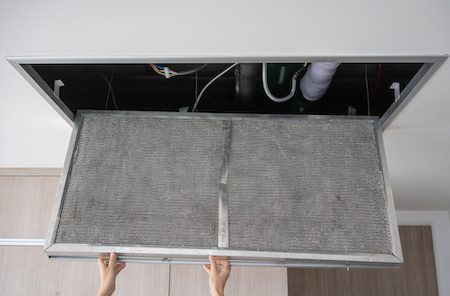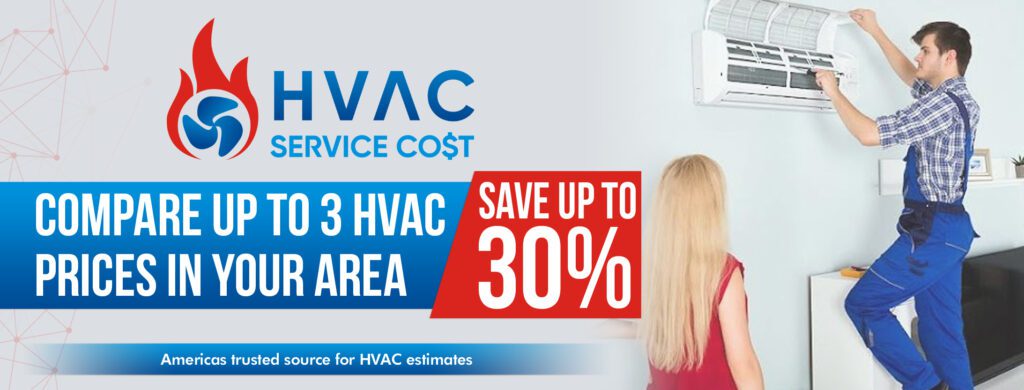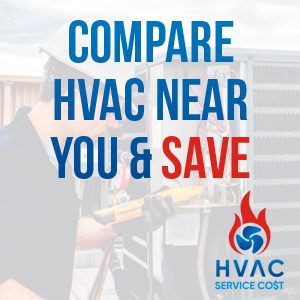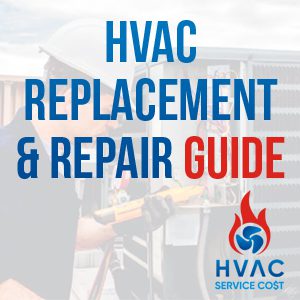
Buyer’s Guide: The 4 Main Types of HVAC Systems
Heating, ventilation, and air conditioning (HVAC) systems are essential for maintaining a comfortable and healthy indoor environment. They regulate the temperature, humidity, and air quality in residential and commercial spaces. This buyer’s guide will introduce you to the four main types of HVAC systems: split systems, ductless systems, packaged heating and air systems, and hybrid systems.
COMPARE QUOTES NOW1. Split Systems
Split systems are the most common type of HVAC system and are named so because components are installed both inside and outside the home.
Heating
The heating component is usually located inside and uses a heat exchanger to warm the air. In many cases, this part of the system operates on natural gas. The warmed air is then distributed throughout the home via duct systems.
Cooling
The cooling system is based outside and uses coolant, coils, and a compressor to cool air and eliminate humidity. The cool air is also distributed via ductwork.
Pros and Cons
Split systems are popular due to their efficiency and affordability. They are capable of heating and cooling large areas and are a great choice for homes with existing ductwork. However, they can be expensive to install in homes without ducts and may not be the best option for those looking to minimize energy costs.
2. Ductless Systems
Also known as mini-split systems, these HVAC units have individual units in each room, eliminating the need for ducts.
Heating and Cooling
Each unit contains its own heat exchanger and cooling system, allowing for individual temperature control in different rooms.
Pros and Cons
Ductless systems offer high energy efficiency, which can significantly reduce energy bills. They also provide excellent individual room control and are easier to install than split systems, making them a good choice for older homes or additions. However, they can be more expensive upfront and require more maintenance, as each unit needs to be serviced individually.

3. Packaged Heating and Air Systems
Packaged systems contain both heating and cooling systems in one unit, usually located outside the home. These systems pull in outside air to heat or cool, then push the treated air back into the house.
Pros and Cons
Packaged systems are compact, making them a great choice for homes with limited space. They can also be more affordable than other systems. However, they often have lower energy efficiency, which can lead to higher energy costs over time.
4. Hybrid Systems
Hybrid systems, also known as dual fuel systems, combine the features of split systems with the energy efficiency of heat pumps. They have the ability to switch between natural gas and electric power, depending on which is most cost and energy-efficient.
Pros and Cons
The main benefit of hybrid systems is their energy efficiency. They offer the flexibility to switch between energy sources based on cost and need, which can result in significant savings on energy bills. However, they have a higher upfront cost than other systems.
- When choosing an HVAC system, consider factors such as the size of your home, your climate, the existence of ductwork, and your budget.
- An energy-efficient system may cost more upfront, but it can provide savings in the long term by reducing your energy bills.
- Always consult with a professional to determine the best HVAC system for your unique needs.

What is an HVAC System?
An HVAC (Heating, Ventilation, and Air Conditioning) system refers to different types of systems used in both residential buildings and commercial structures to regulate the internal temperature, humidity, and air quality. They are vital in ensuring a comfortable and healthy indoor environment. Let’s break down the components of a typical HVAC system:
COMPARE QUOTES NOWHeating
Heating units increase the temperature of the indoor air during cold weather. This could be achieved through various types of heating systems like furnaces, boilers, or heat pumps. In forced-air systems, a furnace will heat the air, which is then distributed throughout the building via air ducts.
Ventilation
Ventilation exchanges indoor air with outdoor air, removing moisture, odors, smoke, heat, dust, airborne bacteria, and other harmful particulates. This can occur naturally or be mechanically induced.
Air Conditioning
Air conditioning units cool the indoor air when the outside temperatures are high. This is often done through a split system where the evaporator coils cool the air inside the unit, and the condenser unit releases the heat outside the building.
Air Handler
The air handler is a critical component of the HVAC system and is responsible for the circulation of conditioned air throughout the building. This unit is typically combined with other systems such as heaters or air conditioners in a central HVAC system.
- An HVAC system can be a split system where some components are installed inside and others outside, or it can be a packaged system where all components are housed in one unit.
- When selecting an HVAC system, the choice typically depends on a variety of factors including the size of the space, the climate, energy efficiency requirements, and budget.
- Choosing the right system is crucial to maintaining a comfortable and healthy living or working environment.

New HVAC System vs. HVAC System Repair: How to Tell What You Need
When your HVAC system starts showing signs of trouble, you may find yourself torn between repairing the existing unit or investing in a new one. This decision isn’t always straightforward and can depend on several factors:
- Age of the System
The age of your HVAC system can greatly influence your decision. Most HVAC systems have a lifespan of about 15-20 years. If your system is nearing this age and experiencing frequent breakdowns, it might be more cost-effective in the long run to replace it with a new one.
- Frequency and Cost of Repairs
If your HVAC system requires frequent repairs, this could be a sign that it’s reaching the end of its life. Over time, the cost of continuous repairs can add up and might exceed the cost of a new system. Pay particular attention if the repairs involve critical components such as the heat exchanger or compressor, as these repairs can be particularly expensive.
- Energy Bills
Older HVAC systems are less efficient than the newer models available today. If you notice your energy bills steadily increasing, it could be due to an aging, inefficient HVAC system. A new, energy-efficient system could reduce your energy costs significantly.
COMPARE QUOTES NOWCost of a New HVAC System
The cost of a new HVAC system can vary widely depending on several factors:
Size of the System
The size of the system needed will depend on the size of your home or building. A larger space will require a larger, more powerful, and likely more expensive system.
Type of System
The type of system you choose can also influence the cost. For instance, a ductless system may cost more upfront than a traditional split system but could save money in the long term due to higher energy efficiency.
Energy Efficiency
Higher efficiency units typically come with a higher price tag, but they can also provide savings in the form of lower energy bills over the life of the system.
Installation Costs
Installation costs can vary depending on the complexity of the installation. For example, a system that requires ductwork will be more expensive to install than a ductless system.

The best way to determine whether you should repair or replace your HVAC system is to consult with a trusted HVAC professional. They can assess your current system, consider your unique needs, and provide a cost-benefit analysis of repair versus replacement.
Investing in a new HVAC system or managing the cost of repairs can be a significant financial consideration. To help you better understand, we’ve broken down the average costs associated with new HVAC systems and repairs:
Cost of New HVAC Systems
The cost of a new HVAC system or a total HVAC replacement can vary greatly depending on the type of system, the size of your home, your location, and the specific needs of your household. On average, you can expect to pay between $2,500 and $7,500 for a new HVAC system. Here’s a general idea of what you might expect to pay:
- For a new central air conditioner, you can expect to pay between $2,500 and $7,500, including installation.
- A new furnace will typically cost between $2,000 and $6,000, including installation.
- A ductless mini-split system, which can offer both heating and cooling, may cost between $3,000 and $10,000, depending on the number of indoor units required.
- A heat pump, which can also provide both heating and cooling, typically ranges from $4,000 to $8,000, including installation.
HVAC Repair Costs
The cost of HVAC repairs also varies based on the nature and complexity of the problem, as well as local labor rates. On average, HVAC repairs can range from $150 to $500. However, more significant issues like a compressor replacement can cost up to $2,000. Here are some common repair costs:
- Recharging refrigerant can cost between $250 and $750.
- Replacing a circuit board can cost around $100 to $600.
- A new fan motor can cost between $200 and $650.
- Replacing a heat exchanger can cost from $500 to $1,200.
Remember, regular maintenance can help prevent costly repairs and extend the life of your HVAC system. Always consult with a professional HVAC technician for accurate pricing and advice tailored to your specific needs.
Enhancing Your HVAC System: Electric Furnaces, Smart Thermostats, and More
An HVAC system is more than just a tool to keep your home at a comfortable temperature—it can also significantly impact your indoor air quality and even help you save on energy costs. Here are some enhancements and additions to consider for your HVAC system:
Electric Furnaces
Electric furnaces are a modern alternative to traditional gas furnaces. They operate using electricity, eliminating the need for a natural gas connection. Electric furnaces are known for their efficiency, safety, and ease of installation. They can be an excellent option for smaller homes or buildings and in areas where natural gas is not readily available.
Indoor Air Quality
The quality of your indoor air is crucial for the health and well-being of the occupants in the building. HVAC systems play a significant role in maintaining good indoor air quality by circulating and filtering the air. Regular maintenance of your HVAC system, including changing air filters and cleaning ducts, can ensure it continues to improve the quality of your indoor air.

Natural Ventilation
In addition to mechanical ventilation provided by your HVAC system, natural ventilation can also contribute to a healthier and more comfortable indoor environment. This involves the strategic use of windows, vents, and other openings to allow fresh outdoor air into a building and stale indoor air to exit.
Smart Thermostats
Smart thermostats are a game-changer in the HVAC industry. They allow you to control the temperature of your home remotely through a smartphone app. They can also learn your habits over time, adjusting the temperature based on your schedule to save energy. This can help reduce energy bills and maintain a consistently comfortable temperature in your home.
Outdoor Unit Maintenance
Maintaining your outdoor unit is crucial for the overall performance of your HVAC system. Regular cleaning and servicing can prevent breakdowns and prolong the life of the unit. This not only saves you money on repairs but also gives you peace of mind knowing your HVAC system is working efficiently.
Overall, these enhancements and additions can help ensure your HVAC system is not only maintaining a comfortable temperature in your home or building but also improving your indoor air quality, saving you money, and providing you with peace of mind.
COMPARE QUOTES NOW


Leave a Reply